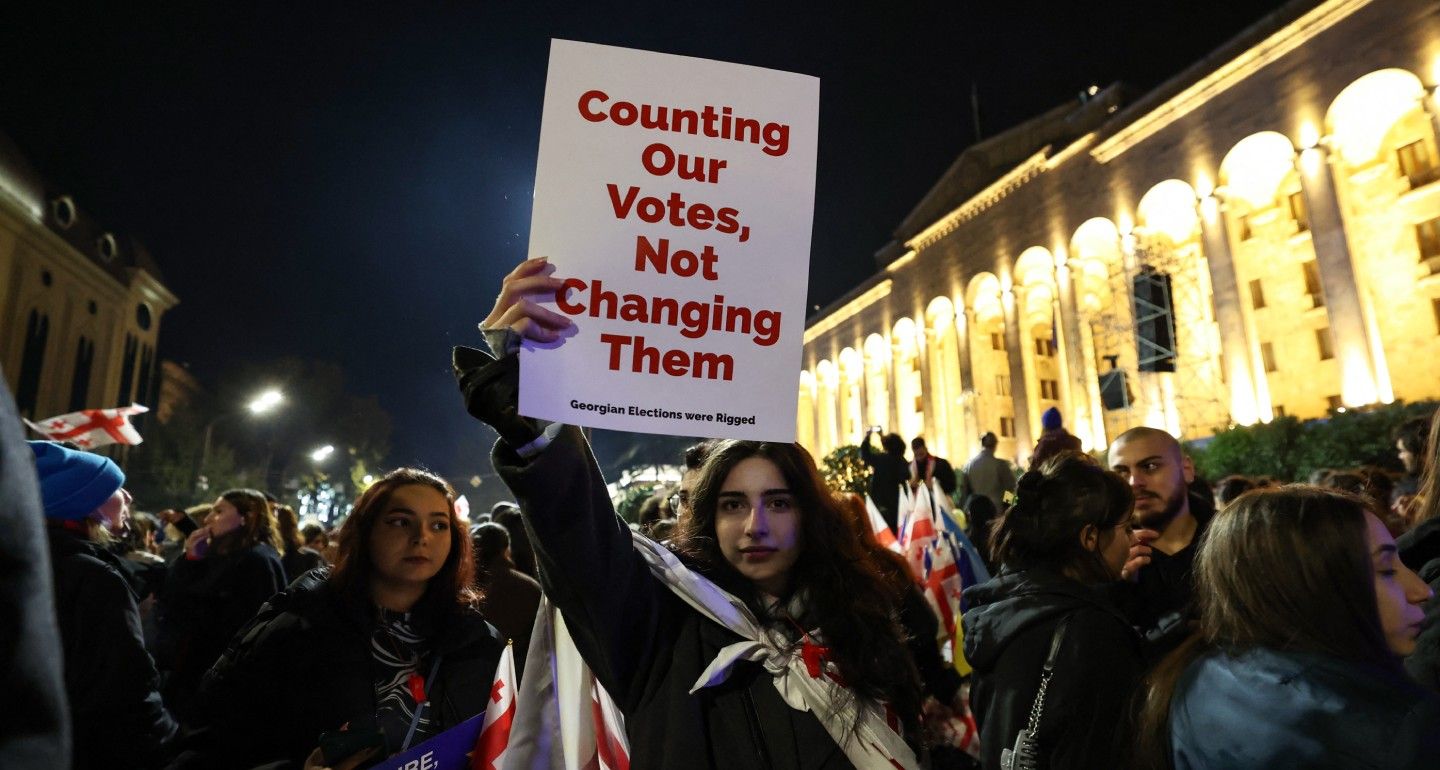What should happen when sanctions designed to weaken the Belarusian regime end up enriching and strengthening the Kremlin?
Denis Kishinevsky
{
"authors": [
"Emil Avdaliani"
],
"type": "commentary",
"blog": "Carnegie Politika",
"centerAffiliationAll": "",
"centers": [
"Carnegie Endowment for International Peace",
"Carnegie Russia Eurasia Center"
],
"collections": [
"Aso Tavitian Initiative"
],
"englishNewsletterAll": "",
"nonEnglishNewsletterAll": "",
"primaryCenter": "Carnegie Russia Eurasia Center",
"programAffiliation": "",
"programs": [],
"projects": [],
"regions": [
"Georgia",
"Europe",
"Russia"
],
"topics": [
"Domestic Politics",
"EU",
"Political Reform",
"EU Foreign Policy",
"Civil Society"
]
}
Source: Giorgi Arjevanidze / AFP via Getty Images
With the West distracted by a series of its own disruptive votes, Georgia’s ruling party has largely managed to withstand pressure both at home and abroad following contested parliamentary elections.
Georgia’s ruling party, Georgian Dream, appears to have weathered the crisis sparked by the opposition’s allegations of electoral fraud during the October 26 parliamentary elections. Although protests continue on the streets of Tbilisi, the ruling party looks set to hold onto power, largely thanks to a combination of both local and international factors.
The first of those factors is the inherent divisions among the Georgian opposition. United into three major coalitions that together garnered about 40 percent of the popular vote, according to official results, the opposition has nevertheless failed to mount a serious challenge to the ruling party, largely because of intraparty differences. There is little love lost among United National Movement, the Ahali party, former prime minister Giorgi Gakharia’s party For Georgia, and the fourth big actor, Lelo.
The post-election period reflects this animosity only too clearly. The opposition parties accused the ruling party of rigging the elections, yet have failed to stage large-scale protests. Instead, rallies are sporadic and poorly attended, with protesters numbering several thousand. One of the reasons for the low turnout is perhaps that the opposition has also so far failed to provide persuasive evidence of alleged massive vote rigging.
The other action taken by the opposition in response to the contested result was for the four opposition parties that won enough votes to be represented in parliament to declare that they would not take up those seats. Many ordinary Georgians simply don’t believe that those parties will stick to the boycott. After all, following the 2020 parliamentary elections, some deputies also declined to take up their seats for nearly six months—only for it all to come to nothing. The opposition deputies eventually resumed their work, angering many of their supporters.
Moreover, Georgian President Salome Zourabichvili, who has positioned herself in opposition to Georgian Dream and was seen as a potential figurehead of a united opposition, has failed to bring unity. She remains popular, but not enough to act as a decisive actor. Other opposition leaders lack the charisma or clean political background required to attract massive popular support.
Still, the opposition’s lack of preparation for the post-election period does not mean that the ruling party has nothing to fear. Georgian Dream’s official majority was just 54 percent: far short of the coveted constitutional majority (113 out of 150 seats in the parliament) that would have allowed it to amend the constitution at will. Had it got less than 50 percent, the party would have had to establish a coalition, which would have weakened its power. The election results showed that the opposition, despite its lack of cohesion, still has the support of a significant proportion of the population.
Ongoing tensions between the ruling party and the opposition make the prospect of any meaningful cooperation doubtful, to say the least. During the election campaign, Georgian Dream said if it won a constitutional majority,it would ban most opposition parties. While some pressure on the opposition is surely in the cards, the ruling party is highly unlikely to make good on its threat, not just because of the legal obstacles, but also for more practical reasons.
Fear of the United National Movement returning to power has proven a potent tool for Georgian Dream to galvanize its supporters in past elections. With no opposition parties left, the ruling party would no longer be able to play up the fear of potential revanchism from the UNM and other related parties, and that could seriously harm the ruling party’s chances in the next elections. In fact, moves to ban the opposition parties may only increase support for the opposition before municipal elections in 2026 or the next parliamentary ones in 2028.
The domestic conditions that have allowed Georgian Dream to weather the current storm have been greatly aided by the rapidly changing international situation, with disruptive elections in EU countries and the United States: Georgia’s two most critical partners. Donald Trump’s election as U.S. president and the most recent collapse of the German government all coming on the heels of the Georgian elections have given Tbilisi some much needed breathing space.
The Georgian election results, though they are likely to be accepted in the end by both the opposition and international observers, will not help to mend Tbilisi’s relationship with Washington and Brussels, which is worse than it has ever been since the breakup of the Soviet Union. While relations are unlikely to get back to normal, a complete breakdown of ties would benefit neither side, especially given the interdependence in terms of east-west transit, infrastructure, and the EU’s ambition to expand ties with Armenia. The West may therefore adopt a more pragmatic, transactional approach, balancing ties with Tbilisi to counter Russian influence in the South Caucasus.
The EU approach will likely consist of freezing relations with Tbilisi as they stand now, i.e., no progress on EU membership, but at the same time refraining from reintroducing visa requirements, since visa-free travel to the EU is highly valued by most Georgians. As for the United States, given the new administration’s expected ambivalence on Ukraine and focus on the Middle East and the Indo-Pacific region, Washington is expected to scale down its engagement with Georgia and the South Caucasus overall.
Georgian Dream can also be expected to remain highly pragmatic. It might offer to repeal the recent controversial “foreign agents” law and perhaps even another on “LGBTQ propaganda” in exchange for normalizing ties with Brussels and resuming the EU membership process. This is what Josep Borrell, vice president of the European Commission, suggested on October 30, though no response has so far followed from Tbilisi.
This transactional approach will further undergird Tbilisi’s multidirectional foreign policy by strengthening connections with Eurasian nations, including Russia, China, Turkey, and possibly Iran. Yet in a largely pro-European society, the ruling party will have to tread carefully. Recent polling still shows that 90 percent of Georgians favor EU membership, while 89 percent oppose alignment with Russia, pushing Georgian Dream to publicly maintain commitment to the EU, albeit selectively.
Carnegie does not take institutional positions on public policy issues; the views represented herein are those of the author(s) and do not necessarily reflect the views of Carnegie, its staff, or its trustees.
What should happen when sanctions designed to weaken the Belarusian regime end up enriching and strengthening the Kremlin?

Denis Kishinevsky
The supposed threats from China and Russia pose far less of a danger to both Greenland and the Arctic than the prospect of an unscrupulous takeover of the island.

Andrei Dagaev
Western negotiators often believe territory is just a bargaining chip when it comes to peace in Ukraine, but Putin is obsessed with empire-building.

Andrey Pertsev
Unexpectedly, Trump’s America appears to have replaced Putin’s Russia’s as the world’s biggest disruptor.

Alexander Baunov
The Kremlin will only be prepared to negotiate strategic arms limitations if it is confident it can secure significant concessions from the United States. Otherwise, meaningful dialogue is unlikely, and the international system of strategic stability will continue to teeter on the brink of total collapse.

Maxim Starchak